
Imagine that you are a police detective. You are good at your job, respected for your calm rationality and dogged determination. As much as you love you work though, your life’s joy is your family. You have a darling daughter. You have a wonderful husband. He is a metal artisan, gentle and loving to a fault, not to mention an extraordinary father.
At least, that is what you thought he was. In reality, he’s the son of a notorious serial killer, living under a stolen identity. He has some empathy issues. He has a criminal record. And he is about to become the primary suspect in your newest case.
This is the premise of tvN’s Flower of Evil. It is pure soap opera material, something the show embraces. The juicy twists and shocking reveals come fast and furious, usually accompanied by blaring orchestral music.
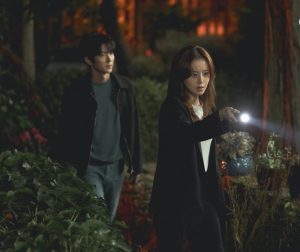
In its first half, Flower of Evil has proven to be a well-executed guilty pleasure, an accomplishment that is nothing to scoff at. The drama is further elevated by the surprisingly subtle and layered way it handles its characters and their relationships. This combination of high-octane theatricality and thoughtful characterizations make Flower of Evil a wildly entertaining gem.
This review contains spoilers.
Dramas are not exactly known for their expeditiousness. Set-ups can consume half a show’s run, and major revelations are often teased for dozens of hours. Flower of Evil bucks that trend, plunging viewers directly into its action-packed narrative from minute one. The drama’s fast pace is refreshing. It also feels necessary, given the quantity of storylines the show is unspooling.
There are serial killers and copycat serial killers, a comatose son locked in a closet, family estrangements, hints of the supernatural, and more red herrings than there are fish in the sea. Those are just the sub-plots. It can be a lot to keep track of, and the sheer amount of over-the-top narrative developments sometimes overwhelms. Luckily, the drama consistently inserts emotional payoffs into even its minor arcs, making each feel worth its while.

Take the story involving the comatose son (Kim Ji-hoon). For much of its run, it seems like pure nonsense, testing viewers patience due to its silliness and lack of connection to the main plot. Then in episode 8, the narrative morphs into an examination of parental grief and guilt. As Flower of Evil delves deeper into the psyches of the unconscious man’s parents, their family’s fate begins to matter. That’s why when the man abruptly awakens at the end of the episode, it feels electrifying, instead of medically dubious.
Flower of Evil also has a knack for using memorable imagery to increase tension or communicate crucial information, rather than relying on expository dialogue. Episode 3 contains a striking sequence in which detective Cha Ji-won (Moon Chae-won) investigates a potential crime scene, her husband Do Hyun-soo (Lee Joon-gi) dangling from a balcony inches away. All that separates her from the truth of her beloved’s sketchy actions is a flimsy pair of window blinds. It is a great visual representation of how tenuous the web of lies Hyun-soo has spun really is.
Good pacing, clever execution, and reliable payoffs draw viewers into Flower of Evil’s melodramatic world. However, it is the drama’s compelling character dynamics, particularly among its leads, that are likely to keep audiences hooked.
Flower of Evil revolves around four main characters. There is our central couple, engaged in a constantly shifting high-stakes game of cat and mouse. Joining them are tabloid reporter Kim Moo-jin (Seo Hyun-woo), and Hyun-soo’s sister Do Hae-soo (Jang Hee-jin). Each of the members of this quartet are brought to dynamic life by their performers. Furthermore, the complex ties which bind Hyun-soo, Ji-won, Moo-jin, and Hae-soo together are well-conceived and vividly conveyed.
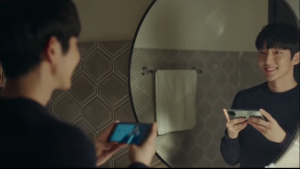
While Hyun-soo and Ji-won receive roughly equal screen time, Hyun-soo feels like the drama’s clear protagonist. This is thanks in no small part to a mesmerizing performance from Lee Joon-gi. Flower of Evil’s driving question seems to be whether Hyun-soo is the warm family man he presents as, the psychopath many suspect him of being, or something in-between. In its early episodes, the show teases that Hyun-soo might not be just the son of a murderer, he could be one himself. As it becomes clear that this is not the case, Hyun-soo evolves from an object of sinister suspense into a fascinating puzzle of a character.
The perpetrator of devastating deception, Hyun-soo is often concerningly detached from conventional morality. Yet, he also displays a fierce protectiveness towards the peaceful life he has painstakingly built, indicating that on some level his family is truly precious to him. Flashbacks have also indicated that he is the probable victim of abuse and social stigma, due to both his father’s crimes and his mental illness.
The way Flower of Evil handles Hyun-soo’s antisocial personality disorder is blessedly nuanced. His condition affects him in formative and obvious ways, but doesn’t define him. It also isn’t static; like any other human being, Hyun-soo is capable of evolution. When his sister Hae-soo meets him after nearly two decades apart, she notices his improved emotional expressiveness and understanding instantly. Whether he recognizes it himself or not, Hyun-soo’s time living as Ji-won’s husband and Eun-ha’s (Jung So-yeon) father has facilitated real growth, even if he still has to practice smiling in their bathroom mirror.
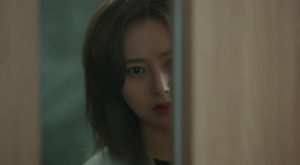
As Ji-won, Moon Chae-won has the hardest of the four primary roles. She is the straight man to Lee’s flashy anti-hero. Ji-won is also the character who suffers most from inconsistent writing. Regardless, Moon Chae-won holds her own, turning in a wonderfully sympathetic performance.
A pillar of logic, Ji-won is strangely suited to dealing with the horrifying predicament she finds herself in. Her devotion to facts and rejection of conjecture prevent her from jumping to conclusions about Hyun-soo, even with damning rumors piling up. As personal and professional interests collide, Ji-won is forced into increasingly challenging moral predicaments. The integrity and humanity she demonstrates in these situations make her Flower of Evil’s most heroic character.
Hyun-soo and Ji-won’s relationship is crucial, and becomes more compelling with each passing episode. At first, their dynamic seems to be all about untruths. Hyun-soo deceives Ji-won their whole marriage, and then Ji-won hides what she has learned so she can investigate him unimpeded. As Flower of Evil progresses, though, new elements are being introduced, complicating the picture. Flashbacks detailing the beginning of their relationship have been especially insightful.
When they met, Hyun-soo’s genial mask was far less fixed. This presents compelling questions as to why Ji-won was so attracted to a cold loner, pursuing him for literally years. It also indicates that at least sub-consciously, Ji-won may be more aware of Hyun-soo’s hidden characteristics than it first appears.
The flashbacks also detail why, despite claiming to be incapable of love, Hyun-soo is so attached to Ji-won. In a powerful scene in episode 5, it is shown that Ji-won’s presence can drive away the apparition of his deceased father that haunts Hyun-soo. This revelation feels like a realistic explanation for Hyun-soo’s determination to be with Ji-won. It gives genuine weight to their connection while avoiding tired romantic tropes. Hopefully, the second half of the drama will continue to expand and explore the complex dynamics of this central relationship.
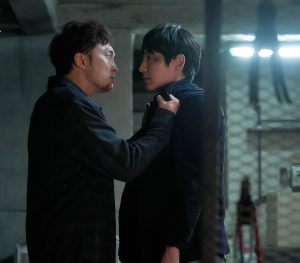
Flower of Evil’s tritagonist is Moo-jin, a pavement-pounding reporter who specializes in sordid crime stories. As Moo-jin, Seo Hyun-woo is an unexpected scene stealer, bringing a welcome dash of humor to the proceedings. He also shows great chemistry with his co-stars.
Moo-jin’s odd-couple dynamic with Hyun-soo is particularly engaging. They have a complicated shared history, growing up in the same small town and alternately terrorizing and aiding each other in both the past and present. An amusingly awkward factor is the romantic history of Moo-jin and Hyun-soo’s sister, Hae-soo, whom Moo-jin still carries a serious torch for.
Hae-soo is the most mysterious main character. She only started getting serious screen time in the last few episodes aired. However, it seems clear that Hae-soo has a crucial role to play in the second half of Flower of Evil. Whether she will prove to be a hero or a villain is far less obvious.
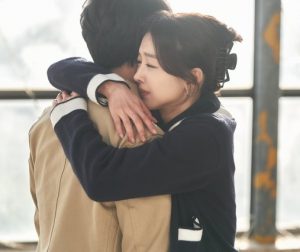
What we have seen of her so far indicates that both are distinct options. Hae-soo is clearly devoted to Hyun-soo, alternately his protector and protected by him. But that doesn’t rule out the possibility of her being the true heir to their father’s murderous tendencies. Whatever the case may be, Jang Hee-jin seems up to the task of bringing Hae-soo’s arc to life. Former Pristin member Lim Na-young also deserves a shoutout for her work as a teenaged Hae-soo in flashbacks. Her convincing balance of innocence and menace is why Hae-soo’s moral position is so intriguingly uncertain.
Outside of its quartet of leads, Flower of Evil largely maintains the same quality of characterization. This is the drama’s ace in the hole. Its twists and turns, however well-executed, are meaningless if its audience doesn’t care about the people experiencing them. Thanks to Flower of Evil’s stellar cast and thoughtful character writing, that is not a problem for this show.
Heading into its second half, Flower of Evil has plenty of mysteries to unravel. Most importantly, it needs to resolve each of its compelling protagonists’ stories in satisfying ways. Will these tormented souls give into their demons? Or will better angels prevail? If Flower of Evil maintains its current level of excellence, the answer is sure to be surprising, emotionally resonant, and just a touch theatrical.
(YouTube. Images via CJ E&M, tvN, Viki)



